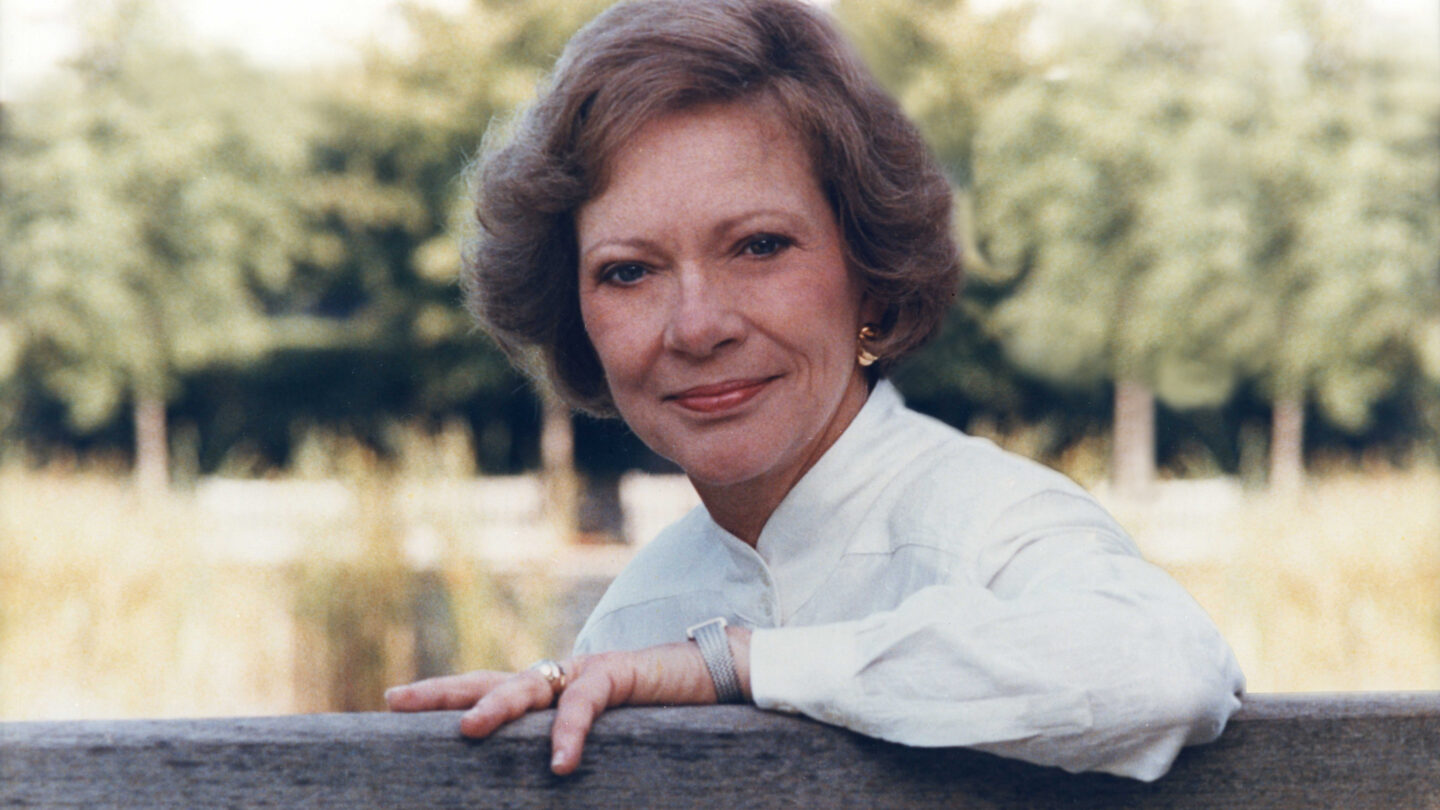La Primera Dama Rosalynn Carter, de 96 años, ha fallecido | Vanity Fair.

Por Mimi Swartz
Es difícil recordar ahora, debido tanto a los tonos rosados del tiempo como a las personalidades y tropezones de las posteriores Primeras Damas, pero Rosalynn Carter, esposa de Jimmy Carter, el 39º presidente de los Estados Unidos, era una mujer dura. La historia ha suavizado sus aristas de manera que muchos la recuerdan vagamente como una dulce mujer sureña, pero fuerte; si no una belleza, alguien que parecía lo suficientemente agradable pero de ninguna manera una triunfadora mundial, nada como la siempre frustrada Hillary Clinton o la supremamente confiada Michelle Obama.
Parte de este legado erróneo tiene que ver con un sesgo geográfico. Rosalynn Carter, quien falleció el domingo a la edad de 96 años después de haber sido diagnosticada con demencia, provenía de una pequeña ciudad de Georgia, al igual que su esposo, y cuando se instalaron en la residencia de 1600 Pennsylvania Avenue, la Washington política sufrió un grave caso de lo que el escritor Nicholas Lemann ha llamado rubeofobia. Los Carter fueron desestimados como rednecks, puros y simples. Hablaban con acento sureño. Habían tenido una granja de cacahuetes. Rosalynn llevaba el mismo vestido que había usado en el baile del gobernador de Georgia de 1971 para su fiesta presidencial en 1977. (Peor aún, provenía de un lugar llamado Jason's en un lugar llamado Americus, Georgia). La pareja prohibió licores fuertes en las cenas de la Casa Blanca. "Simplemente no quiero", le dijo Rosalynn a un escéptico reportero de The New York Times. "No por razones religiosas. Simplemente no quiero. Además, estoy ahorrando el dinero de los contribuyentes". De hecho, los Carter también eran muy devotos, y tal vez por eso es comprensible que los excesos de los años de Reagan llegaran como un alivio tras la partida de los Carter, y por eso la reputación de anticualla de Rosalynn persiste.
Pero ella nunca fue realmente así. Es útil recordar que en 1977 y 1979 una encuesta de Gallup designó a Rosalynn como la mujer más popular del mundo entre los estadounidenses, y en 1980 empató en el mismo honor con la Madre Teresa, cuya reputación desde entonces ha sufrido golpes. Al leer varias cuentas biográficas en los últimos días, lo que ha quedado más claro es cómo Rosalynn Carter logró ser tanto compañera como individuo. Ella era una mujer de una generación que podía (casi pero no del todo) operar de manera independiente, un puente entre las Primeras Damas que eran ayudantes silenciosas y aquellas que podían (casi) actuar como individuos por derecho propio. Aunque no se menciona con frecuencia, los Carter prefiguraron el paquete adicional que posteriormente ofrecieron Bill y Hillary Clinton.
Ella era la persona correcta en el momento correcto para ese cambio social. Eleanor Rosalynn Smith (pronunciado "Ro-sa-linn", nunca "Ro-z-a-linn") creció en circunstancias modestas en Plains, Georgia, vistiendo ropa hecha por su madre costurera. Ella estaba dedicada a su padre, un mecánico de autos y conductor de autobuses, quien la animó a sobresalir en la escuela secundaria, lo cual hizo, y a continuar en la universidad y encontrar horizontes más amplios. Él murió de leucemia cuando Rosalynn tenía 13 años, y ella se sintió impulsada a cumplir sus ambiciones para ella. ("Mi infancia realmente terminó en ese momento", escribiría más tarde en su autobiografía, First Lady from Plains, sobre cuando él le contó sobre su enfermedad.)
El camino hacia ese mundo más amplio apareció en forma de un estudiante de la Academia Naval de EE.UU. llamado James Earl Carter Jr., con quien comenzó a salir en 1945. (Se habían conocido años antes, cuando Carter tenía tres años, y su madre, una enfermera emprendedora a quien llegaron a conocer como "Miz" Lillian, ayudó a dar a luz a Rosalynn.) Su historia de amor al casi primer vistazo se convirtió en un elemento básico de los informes de noticias desde el momento en que Jimmy comenzó a postularse para un cargo público, y para cuando fue elegido presidente, era parte de un brillo romántico que tanto atrae a los escritores de características. La historia tiene permanencia porque era cierta. Sí, Rosalynn estaba realmente molesta cuando, en 1953, Jimmy renunció a su carrera naval (y a los viajes que a ella le gustaban) para dirigir la granja de cacahuetes de la familia en Plains después de que murió el padre de Carter. Sin embargo, eso fue el comienzo de la colaboración que eventualmente llevó a Jimmy al Senado Estatal de Georgia y luego a la mansión del gobernador. "Desarrollamos una asociación cuando trabajábamos en el negocio de suministros agrícolas, y continuó cuando Jimmy se involucró en la política", dijo Rosalynn a Associated Press. "Yo sabía más en papel sobre el negocio que él. Él seguía mis consejos sobre las cosas". Jimmy no discutió. "Lo mejor que he hecho en mi vida fue casarme con Rosalynn", dijo en una entrevista del Carter Center en 2015. "Eso es lo más importante en mi vida".
Rosalynn Carter junto a su esposo, Jimmy Carter.
That kind of alliance was relatively new in the 1970s. Rosalynn was willing to take on the traditional First Lady duties, like picking a noble cause and promoting it. (Hers was mental health.) She managed the lives of the four Carter children—some of whom moved into the White House, with spouses—and established a precedent by requesting that the press leave her youngest child, Amy, then nine, out of the news. (A lot of grousing ensued at the time.)
Simultaneously, Rosalynn served as a true partner in her husband’s presidency. She applied herself like the A student she had been in high school, studying briefings, sitting in on cabinet meetings, taking notes, serving as an all-purpose adviser, rewriting dry speeches, heading diplomatic trips, and sharing her opinion during pillow talks. She was the first First Lady to have her own office in the East Wing and was not happy with media accounts that suggested she didn’t know how to throw a proper dinner party. (After all, she had been First Lady of Georgia.)
Then there were her diplomatic duties. President Carter was famously thin-skinned, and grew more so as his political capital declined—it went from a high of 75% in 1977 to a 28% low in 1979. Aides came to learn that Rosalynn was the lone confidant who truly had his ear. “She was the only person who could talk to Jimmy with total frankness because he knew she had his back,” the author Lawrence Wright, who has written extensively about the Carters, told me. “People who worked for him talked about how prickly and how stern he was, but she just went right past that.”
Still, Rosalynn got testy herself when her husband referred to her in The New York Times as “a perfect extension of myself.” She wasn’t interested in being an extension of anyone. “You can make the First Lady’s job whatever you want it to be,” she said at the time. “To some women, the job is more involved with the entertaining. They feel at home doing the things at home. I’ve always worked. I can’t stay at home and do Cokes and teas, although I think that for those people who want to do that, then that’s surely important to them.” (Rosalynn’s qualifier probably saved her from the drubbing Hillary Clinton got for saying nearly the same thing in 1992.) Rosalynn worked hard with former First Lady Betty Ford to back the passage of the Equal Rights Amendment, and its failure to be enacted was one of the biggest disappointments of her White House years.
If Jimmy Carter became known for redefining a former president’s post-presidential years as one of activism and good works, Rosalynn deserves equal credit. Their teamwork continued with the creation of the Carter Center, the goal of which is to advance human rights and improve health, and the couple traveled the world monitoring elections, helping to eradicate disease, and supporting the growth of democratic institutions. In the US, they supported Habitat for Humanity, building homes in underserved areas. The only thing they didn’t share was the 2002 Nobel Peace Prize, which went to her husband alone, an indication that even the closest partnerships can only go so far.
Undaunted, Rosalynn kept at her good works. She continued to be an advocate for mental health, establishing, among other things, the Rosalynn Carter Institute for Caregivers. Perhaps more importantly, she successfully fought for insurance coverage of mental illnesses, which passed Congress in 2008.
The Carters celebrated their 75th wedding anniversary in 2021 with a big bash back in Plains, when she was 93 and Jimmy 96. He attributed the success of their marriage to mutual interests that included bird watching and shared Bible reading. I attribute it to a woman who found a balance between being a loyal wife and being loyal to herself.
As the end came closer, they seemed to be going their separate ways. Jimmy opted for hospice care at home after a series of health crises, while Rosalynn slipped into dementia. Then, by this November, she too became a residential hospice patient. They had put away their twin StairMasters and settled into twin recliners, waiting for one of the few things they couldn’t pursue together.




